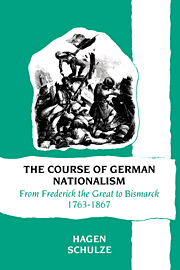Book contents
- Frontmatter
- Contents
- List of maps
- Chronological table
- Map 1 The German Confederation, 1815
- Map 2 The German Customs Union, 1834
- Introduction
- I Three weeks in March
- II The German nationalist movement's road to the creation of the Reich
- 2 The background: Europe's transformation from an agrarian society to a modern civilisation of the masses
- 3 The rise of a national culture
- 4 What has become of the German Fatherland?
- 5 The nationalist movement's passage from an elitist to a mass phenomenon
- 6 From Rhine Crisis to revolution
- 7 1848: the whole of Germany it shall be
- 8 On the road to a national economy
- 9 Speeches and majority decisions
- 10 Blood and Iron
- 11 Revolution from above and below
- III Documentary appendix
- Notes
- Bibliography and source material
- Notes to bibliography
- A critical bibliography of works in English
- Index
9 - Speeches and majority decisions
Published online by Cambridge University Press: 06 January 2010
- Frontmatter
- Contents
- List of maps
- Chronological table
- Map 1 The German Confederation, 1815
- Map 2 The German Customs Union, 1834
- Introduction
- I Three weeks in March
- II The German nationalist movement's road to the creation of the Reich
- 2 The background: Europe's transformation from an agrarian society to a modern civilisation of the masses
- 3 The rise of a national culture
- 4 What has become of the German Fatherland?
- 5 The nationalist movement's passage from an elitist to a mass phenomenon
- 6 From Rhine Crisis to revolution
- 7 1848: the whole of Germany it shall be
- 8 On the road to a national economy
- 9 Speeches and majority decisions
- 10 Blood and Iron
- 11 Revolution from above and below
- III Documentary appendix
- Notes
- Bibliography and source material
- Notes to bibliography
- A critical bibliography of works in English
- Index
Summary
The doldrums of domestic policy ended with the advent of 1857, when the Prussian throne changed hands; the mentally deranged Friedrich Wilhelm IV was replaced by his brother Prince Wilhelm who assumed the regency on 7 October 1858 and, contrary to the image of ‘Cartridge-Prince’ which the Prince Regent had cultivated in March 1848, dismissed Manteuffe's conservative ministry, appointing in its place a conservative/Liberal cabinet of the ‘new era’, under Count Karl Anton von Hohenzollern-Sigmaringen, reputedly a nationalist and a progressive. However, it was not only the Liberal turn of affairs which enlivened politics but also the economy. Once again, economic growth had slowed down. The initial spurt of the fifties had created an over-optimistic climate for investment at a time when the market's capacity for absoption was temporarily exhausted. Commodity prices sank, and the economic depression was worsened by the news of a banking crisis in New York, which also affected north Germany via London.
On top of this the question of an united Germany was thrown up again by the Italian crisis staged by Napoleon III, and brought back into the wider political scene. Louis Napoleon, the great Corsican's nephew, who, like him, had become Emperor of France by means of a coup, was the greatest cause of unrest in Europe in the fifties and sixties. As the heir to Revolution and Ceasarism, his legitimacy did not rely on the concept of Divine Providence, which had presided over the European ‘system’ of peace established in 1815, but on the consent of the masses, and thereby on alignment with the massively effective ideologies of the new age.
- Type
- Chapter
- Information
- The Course of German NationalismFrom Frederick the Great to Bismarck 1763–1867, pp. 82 - 88Publisher: Cambridge University PressPrint publication year: 1991



